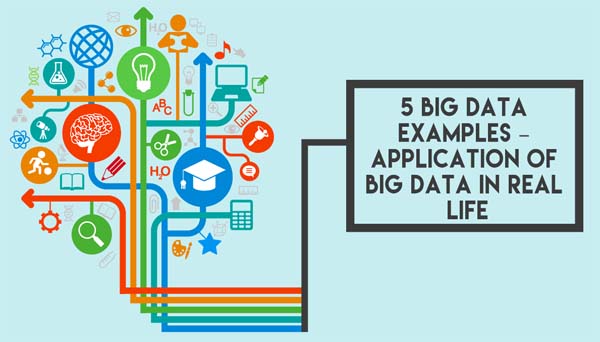What Is An Example Of Big Data? Explained With Real-Life – Big data is a term used to describe the large volume of data both structured and unstructured that inundates a business on a day-to-day basis.
But what is an example of big data, and how is it used in different industries? In this article, we will explore big data and provide real-life examples to help you understand how it works.
In today’s digital world, data is generated at an unprecedented rate. With the rise of social media, e-commerce, IoT devices, and other technologies, the amount of data being generated every day is mind-boggling.
Big data is a term used to describe this large volume of data that inundates businesses every day. But what exactly is big data, and why is it important?

Characteristics of Big Data
Before we dive into examples of big data, it’s essential to understand the characteristics that define it. Big data is commonly characterized by the four Vs – volume, velocity, variety, and veracity.
Volume
Volume refers to the vast amount of data generated every day. According to IBM, we create 2.5 quintillion bytes of data every day, and this number is expected to grow in the coming years.
Velocity
Velocity refers to the speed at which data is generated and must be processed. With the rise of real-time data streams, businesses must be able to process data in real-time to make informed decisions.
Variety
Variety refers to the different types of data that are generated, including structured, unstructured, and semi-structured data. This can include text, images, videos, audio, and more.
Veracity
Veracity refers to the quality and accuracy of the data being generated. Big data can be noisy, meaning it contains errors, making it challenging to analyze.
Examples of Big Data
Now that we have a better understanding of what big data is and its characteristics let’s look at some real-life examples.
Healthcare
Healthcare generates a massive amount of data every day, including patient records, medical imaging, lab results, and clinical trials. All this data is collected and stored in electronic health records (EHRs), which are used by doctors and other healthcare professionals to diagnose and treat patients.
By using big data analytics tools, healthcare providers can analyze EHRs to identify patterns, trends, and insights that can help improve patient outcomes. For example, big data can be used to identify patients who are at high risk of developing chronic diseases such as diabetes or heart disease.
Social Media
Social media platforms generate vast amounts of data every day. Facebook, for example, has over 2.8 billion active users who generate a staggering amount of data every minute. This data includes text, images, videos, likes, comments, and shares.
By analyzing this data, social media companies can gain insights into user behavior, preferences, and interests. This can help them personalize content, improve user engagement, and even target ads more effectively.
E-commerce
E-commerce companies generate a vast amount of data every day, including customer transactions, website visits, and search queries. By analyzing this data, e-commerce companies can gain insights into customer behavior, preferences, and buying habits.
For example, Amazon uses big data to personalize product recommendations based on a customer’s browsing and purchasing history. This not only improves the customer experience but also increases sales and revenue for the company.
Internet of Things (IoT)
The Internet of Things (IoT) refers to the growing network of connected devices, from smart homes to smart cities. These devices generate a massive amount of data every day, including sensor data, geolocation data, and more.
By analyzing this data, businesses and governments can gain insights into everything from traffic patterns to energy consumption. For example, cities can use IoT data to optimize traffic flow, reduce energy consumption, and improve public safety.
Big Data Applications
Big data has numerous applications in a wide range of industries, including:
Business Intelligence
Big data can be used in business intelligence to gain insights into customer behavior, optimize supply chains, and improve decision-making. By analyzing customer data, businesses can personalize marketing messages, improve customer service, and increase sales.
Healthcare
Big data can be used in healthcare to identify patterns and insights that can improve patient outcomes, reduce costs, and drive innovation. By analyzing electronic health records, healthcare providers can identify patients at high risk of developing chronic diseases and develop personalized treatment plans.
Marketing
Big data can be used in marketing to personalize content, improve user engagement, and target ads more effectively. By analyzing customer data, marketers can identify user behavior, preferences, and interests and tailor marketing messages accordingly.
Finance
Big data can be used in finance to improve risk management, detect fraud, and optimize investment portfolios. By analyzing financial data, businesses and governments can gain insights into market trends, customer behavior, and more.
Benefits and Challenges of Big Data
Big data has numerous benefits, including improved decision-making, increased revenue, and reduced costs. However, it also poses several challenges, including data privacy and security concerns, as well as the need for specialized tools and expertise.
Conclusion
In conclusion, big data is a critical component of today’s digital world, generating vast amounts of data every day. By analyzing this data, businesses and governments can gain insights that were previously impossible to obtain.
From healthcare to marketing to finance, big data has numerous applications in a wide range of industries, making it an essential tool for businesses looking to stay ahead of the competition.
Read More:
Big Data Architecture: Designing for Scale, Speed, and Flexibility
Big Data Definition: The Power Of Massive Data Sets
Big Data Technologies of Data Analysis And Business Intelligence
Big Data Provider: Revolutionizing the Way Businesses Operate
Discover The Top Big Data Analytics Tools For Your Business